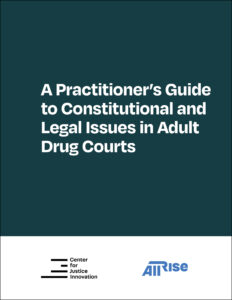Drug courts have become a common feature of court systems across the country, offering an effective, evidence-based approach to addressing the underlying substance use disorders that often contribute to crime. There are approximately 1,700 adult drug courts operating across the U.S. Federal and state governments have invested hundreds of millions of dollars to plan, operate, train, and evaluate these courts. Research shows that drug courts save lives, reduce reoffending, strengthen families, and improve public trust in justice. One of the major critiques of drug courts, however, is that they raise constitutional and legal concerns related to due process, right to counsel, access to appropriate treatment, confidentiality of information, and other fundamental legal protections. It is critically important that drug court judges, attorneys, and partner agencies understand these constitutional and legal issues to ensure their courts conform to the law and protect the rights of participants.
This guide is intended to help practitioners identify and navigate the major legal issues that arise in adult drug courts. It is organized in a chronological fashion that follows the typical drug court process from start to finish, exploring the legal issues that arise at each stage.


